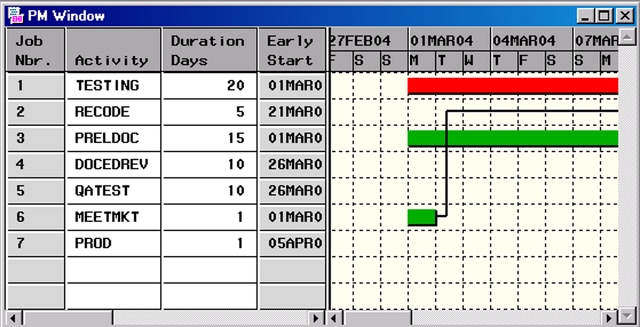| The PM Procedure |
Getting Started: PM Procedure
Consider the simple software development project described in the "Getting Started" section of Chapter 2, The CPM Procedure. Recall that the Activity data set, SOFTWARE, contains the activity descriptions, durations, and precedence constraints. The following statements (identical to the PROC CPM invocation) initialize the project data and invoke the PM procedure.
data software;
input Descrpt $char20.
Duration 23-24
Activity $ 27-34
Succesr1 $ 37-44
Succesr2 $ 47-54;
datalines;
Initial Testing 20 TESTING RECODE
Prel. Documentation 15 PRELDOC DOCEDREV QATEST
Meet Marketing 1 MEETMKT RECODE
Recoding 5 RECODE DOCEDREV QATEST
QA Test Approve 10 QATEST PROD
Doc. Edit and Revise 10 DOCEDREV PROD
Production 1 PROD
;
proc pm data=software
out=intro1
interval=day
date='01mar04'd;
id descrpt;
activity activity;
duration duration;
successor succesr1 succesr2;
run;
When you invoke the PM procedure, the PM window appears (see Figure 5.1), consisting of the Table View and the Gantt View of the project. The activities are listed in the order in which they are defined in the Activity data set. The two views are separated by a dividing line that can be dragged to the left or right, controlling the size of the two views. Further, the two views scroll together in the vertical direction but can scroll independently in the horizontal direction.
The Table View contains several editable columns (in white) that can be used to edit the project data as well as add new activities to the project. Some of the columns (in gray), such as the Schedule times, are not editable. The Gantt View contains a Gantt chart of the project and displays the precedence relationships between the activities. You can use the Gantt View to add or delete precedence constraints between activities and to change the durations or alignment constraints of the activities by dragging the schedule bars. Details of the interface are described in the section Details: PM Procedure.

Copyright © SAS Institute, Inc. All Rights Reserved.